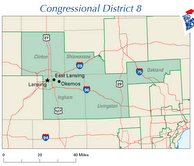Reprinted from MichiganLiberal, with permission.
I don't know if this is a direct transcript from yesterday's testimony by automakers before a House subcommittee on global warming and fuel standards, but if this is something Mike Rogers said...
What if we came up with a way to come up with a different kind of incentive? I'm a big ethanol guy. It's like giving a good salute to the Iranian Ayatollah every time I step on the gas. I love it.
...it might help explain the pounding headache I have this morning.
The story of ethanol is an American story, a new technology touted to be our key to giving more of our money to the American farmer (God bless his early-rising soul) and less to the nutty, crazed America-hating shieks in the Middle East.
There's just a slight problem.
There isn't enough corn in the Good Old U.S. of A. to satisfy our needs. In fact, the total ethanol output we could get from our corn crop would barely make a dent in the nation's fuel needs, and that's if we converted all of our corn to ethanol. (Speaking of which, Iowa is on track to use so much corn to make ethanol that eventually it'll have to import it from other states.)
That means that we, like our friends in Mexico (where food riots have already broken out over the rising cost of tortillas), will see a steady increase in the cost of food (the USDA is already predicting an increase in the cost of meat before too long).
In other words, every time Mike Rogers steps on the gas pedal, he is giving a salute to the Iranian ayathollahs, but he's also giving a different kind of salute to the American consumer.
We also know the other problem with corn-based ethanol ... as a way to reduce greenhouse gas emissions, it is of questionable value (if you go with some other kind of plant -- Rogers alludes to switchgrass on his Web site -- the benefits are more evident ... as long as you don't use coal to heat your mash).
But, Rogers wasn't on about greenhouse gases. In fact, he apparently doesn't think global warming is a problem.
"I do think there is contradictory science," Rogers said. "Rather than arguing about 'is it there or isn't it there,' the things we can agree on are emissions ... we can all agree that pollution is bad and there is much we can do and do together to eliminate pollution."
If Mike Rogers is calling carbon dioxide a pollutant, it puts him at least ahead of Antonin Scalia, who expressed reservations in calling CO2 a pollutant during testimony last year in front of the Supreme Court. But, if he thinks there's science on "both sides" (just what this "other" side is, and what the science is that supports it is anyone's guess), it's more likely that he's after energy independence rather than environmental protection.
Energy independence is a good idea, but it isn't the same thing as reducing greenhouse gas emissions to reduce our impact on the world's climate. You could, for instance, become totally energy independent if you started transforming our very abundant supply of coal to synthetic fuels (the technology for this has been around since World War II), but the entire manufacturing process releases even more carbon dioxide into the atmosphere than simply burning gasoline.
Politicians keen to win points by giving struggling farmers a cash crop to revive agriculture aren't the only folks guilty of conflating the two. During yesterday's testimony, the automakers did it, too.
"New vehicle efficiency improvements alone will never result in the overall decline in petroleum consumption and the greenhouse gas emissions we need," said Chrysler Group President Tom LaSorda.
Of course, not, but let's not confuse the two goals. They might eventually have a similar solution, and they might both be rooted in a long-standing overdependence on OPEC oil, but they are still very different things.
The problem, if both the testimony and the News story got it right, is that the focus is solely on E85 and flex-fuel engines (if Congress both raised mileage requirements and encouraged flex fuel engines, they'd have to adopt two sets of standards for two types of engines, since the lower-powered ethanol provides fewer miles per gallon). Yet, there is not even a nod in the direction of ethanol's pressing availability issues. Not only can we not grow enough corn to supplant gasoline, but it's also highly corrosive, creating substantial problems in transporting it efficiently from agricultural areas to population centers.
These are hardly state secrets. In fact, Rogers introduced legislation meant to help gas stations install ethanol pumping equipment (how the ethanol would get from Iowa to Florida is another story). So, it's hard to imagine that he and the Big Three are unaware of the serious limitations of their proposed alternative.
But, the real problem isn't with ethanol. It's a matter of leadership. So far no one in elected office has come clean with the American people ... ethanol could very well be part of the solution (I've seen references to the possibilities of fueling farm vehicles with ethanol, which seems reasonable), but to play it up like a silver bullet solution is to misguide the American people.





No comments:
Post a Comment